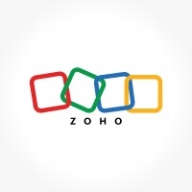


Find out what your peers are saying about Salesforce, Microsoft, SAP and others in CRM.
Salesforce Sales Cloud is a fantastic tool but requires disciplined data entry by sales personnel and operations teams to maintain data quality.
We are not just implementing Salesforce Sales Cloud; we need to understand what the customer wants to achieve in 5 to 10 years.
Support requires a subscription and when taken, the service is pretty nice.
Sometimes, they don't understand what my actual needs are.
The 1.5 deduction from 10 is due to cultural communication differences based on where we're getting the support, as sometimes it takes a couple of times to communicate clearly enough for them to understand the issue.
There are multiple blogs and articles available online for self-help.
Salesforce is highly scalable and operates efficiently.
Salesforce Sales Cloud is totally cloud native, requiring no additional effort for scalability.
The system is easy to understand, implement coding, and conduct training.
Zoho CRM is quite scalable; I have worked with clients who started with ten companies and have scaled up to managing 500 employees effectively within Zoho CRM.
The platform's global data centers across regions such as the US, EU, and India ensure data security and privacy through ISO certification and strong role-based security, which is essential for handling sensitive customer data.
We haven't really had any technical challenges with Oracle CRM.
Regarding the stability of Oracle CRM, nobody is facing any major issues in terms of infrastructure problems whether it is Oracle CRM, Salesforce, or SAP CRM; they are all the same, especially with cloud-based SaaS.
Salesforce Sales Cloud is very stable.
I have not experienced any degradation in Salesforce's performance.
Zoho CRM guarantees 99% uptime, with downtime incidents being very rare.
I find Zoho CRM to be 100% stable and reliable as far as I know.
It is usually compliant with data regulation laws and is HIPAA compliant.
It's already integrated into our environment, so moving to something else will require a massive investment and change in strategy that we as an organization are not prepared to embark on just yet.
When a client asks for any support, they're often in real trouble and need a prompt response.
The AI feature needs improvement.
Compared to AWS, it is slower, which could be a hindrance.
With today's generative AI capabilities like ChatGPT, it should be possible to directly communicate with the software rather than navigating through the entire system manually.
The platform does not save code versions similar to GitHub, where you can compare new versions with previous ones.
Some organizations may prefer not to have their data on the internet since Zoho CRM runs as a cloud service.
The main improvement needed for Zoho CRM is introducing SQL code for reports, similar to what's in Zoho Analytics.
Without negotiation, costs can become expensive.
This happened for the first time because of the new CEO, Arundhati, who revolutionized pricing strategies, allowing discounts of 60-70% for Salesforce Sales Cloud in India.
I would rate the price for Salesforce Sales Cloud as a three, where one is a high price.
Zoho CRM and all of Zoho's software are quite affordable because they are specifically designed for small and medium businesses.
In terms of my experience with the price and licensing cost, as with setup cost for Zoho CRM, it might not be quite affordable because there are cheaper solutions available.
The biggest advantage of Oracle CRM for me is the process coverage, ease of use, the UI, and obviously a good amount of analytics; these are the few strengths and seamless integration with any platform.
Currently it's meeting all our needs, hence the migration about six months ago that we moved from on-premise to OCI, to the cloud-based platform to add additional capacity and analytics.
The solution serves end-to-end customer relationship management which includes sales cloud, e-commerce cloud, and marketing cloud.
Its easy-to-navigate interface aids in delivering clear vision and organization, especially for sales and business management.
The Einstein Analytics and the inbuilt reporting are very useful for keeping track of pipeline movement.
The biggest benefit of the Salesforce Sales Cloud is a centralized point, a centralized source of truth for customer-related information; you centralize all the information in a single database, and that's the biggest benefit.
The most valuable aspect of CRMs, including Zoho CRM, Salesforce, and Microsoft Dynamics, is automation capabilities.
The most valuable feature I have found in Zoho CRM is custom functions. You can achieve anything with it. From integrations with other applications, it is instant.
You can customize everything—what you sell, be it products, services, or projects.
| Product | Market Share (%) |
|---|---|
| Salesforce Sales Cloud | 2.8% |
| Zoho CRM | 1.6% |
| Oracle CRM | 1.1% |
| Other | 94.5% |



| Company Size | Count |
|---|---|
| Small Business | 17 |
| Midsize Enterprise | 2 |
| Large Enterprise | 22 |
| Company Size | Count |
|---|---|
| Small Business | 54 |
| Midsize Enterprise | 26 |
| Large Enterprise | 40 |
| Company Size | Count |
|---|---|
| Small Business | 44 |
| Midsize Enterprise | 6 |
| Large Enterprise | 10 |
On demand CRM with contextual intelligence, adaptive business planning, and analytics. Supports cloud integration with Outlook and mobile devices, as well as sales and marketing applications. Multi-tenancy or single-tenancy options available.
Salesforce Sales Cloud is a comprehensive tool lauded for its customization, ease of use, and integration capabilities. Its cloud-based nature offers seamless access and scalability, helping manage leads, opportunities, and workflows efficiently. Powerful reporting and dashboards enhance visibility and productivity.
Salesforce Sales Cloud serves as an essential aid for companies aiming to streamline sales processes. It integrates sales and marketing, manages customer data, and supports automation, which increases efficiency. Despite its expense and complex interface, its ability to forecast, track customer engagement, and automate key workflows stands out. Companies encounter challenges with system costs and integration issues, particularly regarding third-party applications and mobile functionality. Reporting and dashboards offer significant insights, although room for improvement exists. Licensing costs and storage fees are considerations for prospects, alongside the need for improved training and AI features. Users maximize the platform for sales pipeline management, forecasting, and operational analytics.
What are the most important features?Organizations across industries utilize Salesforce Sales Cloud from finance to healthcare for business development and CRM tasks. It is integral to managing accounts, leading pipelines, and aligning sales with marketing strategies. Firms improve customer relations and operational efficiency through its analytics and reporting capabilities.
Zoho CRM empowers organizations with a complete customer relationship lifecycle management solution for managing organization-wide Sales, Marketing, Customer Support & Service and Inventory Management.